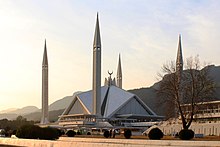| Faisal Mosque | |
|---|---|
فیصل مسجد | |
 | |
| Religion | |
| Affiliation | Islam |
| Location | |
| Location | Islamabad |
| Municipality | Capital Development Authority |
| Country | Pakistan |
| Administration | International Islamic University, Islamabad |
| Geographic coordinates | 33°43′48″N 73°02′18″E / 33.729944°N 73.038436°E |
| Architecture | |
| Architect(s) | Vedat Dalokay |
| Type | Mosque |
| Style | Modern Islamic |
| Date established | 1986 |
| Construction cost | US$120 million |
| Specifications | |
| Capacity | 300,000 worshippers |
| Minaret(s) | 4 |
| Minaret height | 90 m (300 ft) |
| Site area | 130,000 m2; 1,400,000 sq ft |
The Faisal Mosque (Urdu: فیصل مسجد, romanized: faisal masjid) is the national mosque of Pakistan, located in the capital city, Islamabad.[1][2] It is the fifth-largest mosque in the world, the largest mosque outside the Middle East, and the largest within South Asia, located on the foothills of Margalla Hills in Islamabad. It is named after the late King Faisal of Saudi Arabia. The mosque features a contemporary design consisting of eight sides of concrete shell and is inspired by the design of a typical Bedouin tent.[3]
A major tourist attraction in Pakistan, the mosque is a contemporary and influential piece of Islamic architecture.[4][5]
Construction of the mosque began in 1976 after a $28 million grant from Saudi King Faisal, whose name the mosque bears.[6] The unconventional design by Turkish architect Vedat Dalokay was selected after an international competition.[7][4] Without a typical dome, the mosque is shaped like a Bedouin tent, surrounded by four 260 feet (79 m) tall minarets. The design features eight-sided shell shaped sloping roofs forming a triangular worship hall which can hold 10,000 worshippers.[8]
Combined the structure covers an area of 33 acres (130,000 m2; 1,400,000 sq ft), the mosque dominates the landscape of Islamabad.[6] It is situated at the north end of Faisal Avenue, putting it at the northernmost end of the city and at the foot of Margalla Hills, the westernmost foothills of the Himalayas. It is located on an elevated area of land against a picturesque backdrop of the national park. Faisal Mosque was the largest mosque in the world from 1986 until 1993 when it was overtaken by the mosques in Saudi Arabia. Faisal Mosque is now the sixth largest mosque in the world in terms of capacity.[9][10]
- ^ Len McGrane (January–February 1992). "A Mosque in Islamabad". Saudi Aramco World magazine. Aramco Services Company. Archived from the original on 18 February 2007. Retrieved 29 November 2007.
- ^ Neelam Naz (13 September 2005). "Contribution of Turkish architects to the national architecture of Pakistan: Vedat Dalokay" (PDF). Journal of the Faculty of Architecture. 22 (2). Ankara, Turkey: Middle East Technical University: 56–64. Archived from the original (PDF) on 23 November 2018. Retrieved 29 November 2007.
- ^ "Three Pakistani mosques make it to 'world's most beautiful mosques' list". The Express Tribune. 3 August 2015. Retrieved 2 March 2021.
- ^ a b "King of All Mosques – Faisal Mosque". HOPES. 6 November 2015. Retrieved 17 December 2019.
- ^ "Faisal Mosque attracts visitors from all over country". The News International. Retrieved 17 December 2019.
- ^ a b "Faisal Mosque not a 'gift' by Saudi Arabia". Daily Times. 13 February 2017. Retrieved 8 August 2020.
- ^ Mass, Leslie Noyes (2011). Back to Pakistan: A Fifty-Year Journey. Rowman & Littlefield. p. 157. ISBN 978-1-4422-1319-7.
- ^ "Faisal Mosque – Islamabad, Pakistan". www.sacred-destinations.com. Retrieved 17 December 2019.
- ^ "Shah Faisal Mosque in Islamabad & Rawalpindi". Lonely Planet. Retrieved 17 December 2019.
- ^ "Three Pakistani mosques make it to 'world's most beautiful mosques' list". The Express Tribune. 3 August 2015. Retrieved 2 March 2021.
